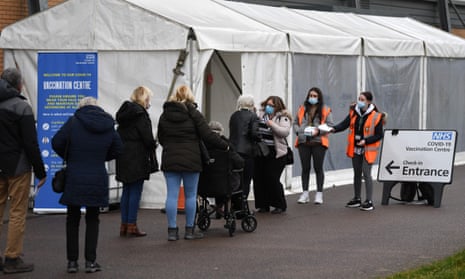A small number of people vaccinated against Covid have been admitted to hospital with the disease and died, researchers have found, but most were frail and elderly and caught the virus before the jab could take effect.
Scientists say their findings are reassuring. They bear out the conclusions of trials of the vaccines in use in the UK, which showed that the jabs are highly effective but do not protect everyone.
However, separate research published in Science suggests that people’s immune responses against the so-called Kent and South African variants are relatively feeble after a first dose of the Pfizer vaccine, but are greatly enhanced among those who have previously had Covid-19. The B117 variant, which was first discovered in Kent, is now the dominant circulating strain within the UK. The results emphasise the need for people to remain cautious until they’ve received their second dose of vaccine.
The Isaric/Co-CIN study into hospitalisations and deaths after vaccination was designed to give the government’s scientific advisory body, Sage, an early signal of whether or not the jabs were working.
“We’re saying that the vaccine does work. In fact, this is good real-world evidence of it working, but there are some few failures. And when these failures do occur, sadly, people die, but that’s because they’re elderly and frail,” said Prof Calum Semple, a co-lead of Isaric (International Severe Acute Respiratory and Emerging Infection Consortium).
More than 52,000 people were admitted to hospital with Covid in England, Scotland and Wales between 8 December and 10 March. Of those, 3,842 had been vaccinated. The researchers had information on the date of the first dose of vaccine for 3,598 of them and information on the date of a second dose for 140.
The vaccines would not be expected to work fully until three weeks after they were given, said Dr Annemarie Docherty, an honorary consultant in critical care at the University of Edinburgh. Most of those admitted post-vaccination were infected just before or in the couple of weeks after receiving their jab. The median time from vaccination to symptoms in the study was 15 days.
“Around 71% of the vaccinated patients that we have in hospital in Isaric developed their symptoms before the vaccine would be expected to work,” she said. “So we’re really only talking about 29% of these patients where we would have hoped the vaccine to prevent hospital admission.”
A total of 526 patients out of 52,000 (1%) had been vaccinated more than three weeks before they developed Covid symptoms and were hospitalised. Of those, 113 died. Most of them (97) were in the two highest risk categories, so frail, elderly or otherwise highly vulnerable.
In their paper for Sage, the researchers said they saw “an abundance of patients admitted to hospital within seven days of vaccination”. Most had been infected around the time of their vaccination. They said it was possible that elderly and vulnerable people who had been shielding were infected when they went to get their shot or soon afterwards because they changed their behaviour, wrongly thinking they were immune.
The researchers said the results had to be looked at in the context of the high levels of infection in the first months of the year and were not representative of what might be happening now.
Semple said this was a good news story. “We feel strongly that this is a story about vaccine success, but as a scientist you have to look hard at the data,” he said. When the researchers saw how fast hospitalisations dropped in the weeks after people were vaccinated, he said, it was “a moment of joy”.
However, the new data outlined in Science on the effectiveness of the Pfizer vaccine against the Kent B117 and South African B1351 variants is a concern, given that three-quarters of those vaccinated in the UK have only received a first dose so far.
The research, led by Danny Altmann and Rosemary Boyton at Imperial College London, involved analysing B- and T-cell responses to a first dose of the vaccine in 24 health workers who had previously recovered from Covid-19, and another 20 who had never been infected. “One dose of the Pfizer vaccine, in terms of all our measurable immune parameters, really does look very, very feeble, and all the more so against variants. And yet, whatever that level of immunity is, it has certainly been enough to have some impact,” Altmann said. “My message from that would be, ‘Hang on in there for a second dose.’
For those who have previously been infected, the study provides further evidence that a first dose of vaccine acts like a booster shot. “You really are in a different league in terms of your immune response, which means you are much more likely to be protected against the original strain and the new variants,” Boyton said.
